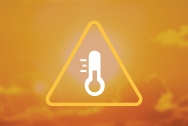ENVIRONMENT Canada has issued a heat warning for August 13 to 17 for the following areas within the Fraser Health and Vancouver Coastal Health regions:
- Fraser Canyon – south including Lytton
- Fraser Valley
- Howe Sound
- Metro Vancouver
- Sunshine Coast
A period of hot and dry weather will start as a strong ridge of high pressure brings rising temperatures to the South Coast and Southern Interior this weekend and into next week. Forecasts are for daytime high coastal temperatures reaching the high 20s or low 30s and inland temperatures reaching the mid to high 30s. Well above seasonal daytime temperatures combined with elevated overnight temperatures will mean little relief from the heat. Temperatures within the region may vary significantly.
Find further details here: Latest Heat Warning: Weather Alert. This heat event is not forecast to meet criteria for an Extreme Heat Emergency.
Negative health effects occur primarily in people at high risk for heat-related illness. These may include:
- seniors aged 65 years or older
- people who live alone
- people with pre-existing health conditions such as diabetes, heart disease or respiratory disease
- people with mental illness such as schizophrenia, depression, or anxiety
- people with substance use disorders
- people who are marginally housed
- people who are pregnant
- infants and young children
- people with limited mobility or other disabilities
Fraser Health and Vancouver Coastal Health encourage the public to check on people with known vulnerabilities to heat-related illness.
Indoor temperatures are the most important determinant of health outcomes. Once a susceptible individual is exposed to sustained high temperatures, it can take many hours for their bodies to cool and for physiological strain to decrease.
The BC Centre of Disease Control provides a broad range of heat-related guidance on its website, including information on the different types of heat alerts, how to prepare for hot temperatures, symptoms of heat-related illnesses, those most at risk during hot weather and ways to stay cool.
Visit fraserhealth.ca/heatsafety and vch.ca/heat for more information about the health impacts of heat, and tips and resources to help stay safe and cool.
Preparing for and responding to hot weather:
- If you have air conditioning at home, make sure it is in good working order.
- If you do not have air conditioning at home:
- Find somewhere you can cool off on hot days. Consider places in your community to spend time indoors such as libraries, community centres, movie theatres or malls. Also, as temperatures may be hotter inside than outside, consider outdoor spaces with lots of shade and running water.
- During daytime: Shut windows and close curtains and blinds during the heat of the day to block the sun and prevent hotter outdoor air from coming inside.
- At night: Open doors and windows when it is cooler outside to move that cooler air indoors.
- Do not rely on fans as your primary means of cooling. Fans can be used to draw cooler late-evening, overnight and early-morning air indoors.
- Keep track of temperatures in your home using a thermostat or thermometer. Sustained indoor temperatures over 31°C can be dangerous for people who are susceptible to heat.
- If your home gets very hot, consider staying with a friend or relative who has air conditioning if possible.
- Identify people who may be at high risk for heat-related illness. If possible, help them prepare for heat and plan to check in on them.
Your health:
- Drink plenty of water and other non-alcoholic liquids to stay hydrated, even if you are not thirsty.
- Alcohol worsens heat intolerance, and increases chances of dehydration.
- Spray your body with water, wear a damp shirt, take a cool shower or bath or sit with part of your body in water to cool down.
- Take it easy, especially during the hottest hours of the day.
- Stay in the shade and use a broad-spectrum sunscreen with SPF 30 or more.
- Take immediate action to cool down if you are overheating. Signs of overheating include feeling unwell, headache and dizziness. Overheating can lead to heat exhaustion and heat stroke.
- Signs of heat exhaustion include heavy sweating, severe headache, muscle cramps, extreme thirst and dark urine. If you are experiencing these symptoms, you should seek a cooler environment, drink plenty of water, rest and use water to cool your body.
- Signs of heat stroke include loss of consciousness, disorientation, confusion, severe nausea or vomiting and very dark urine or no urine. Heat stroke is a medical emergency. Call 911 or your local emergency number if you are caring for someone who displays symptoms of heat stroke, then take immediate action to cool them down while waiting for help to arrive.
If you have a less urgent health issue:
- You can call HealthLinkBC at 811 and speak with a nurse, connect with your family physician if you have one, or go to an urgent care centre or clinic if you can do so safely. That way, our emergency medical dispatch staff and paramedics will be available for people who need their services the most.
- There are also online tools at healthlinkbc.ca, including a “Check Your Symptoms” tool.













